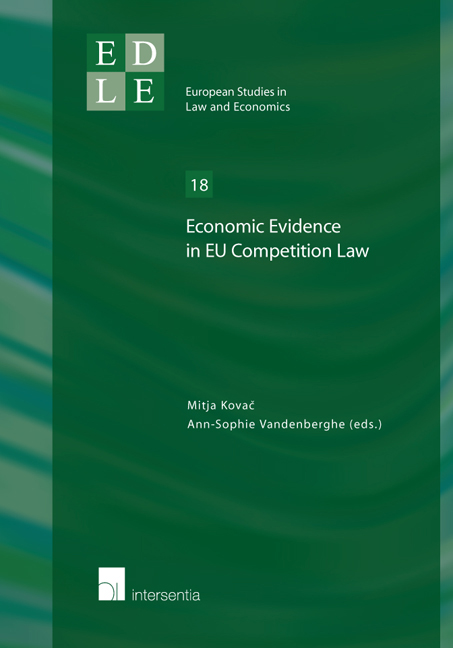Book contents
- Frontmatter
- Dedication
- Preface
- Contents
- List of Contributors
- General Introduction
- PART I ECONOMIC METHODS IN COMPETITION LAW
- PART II ECONOMIC EVIDENCES IN COMPETITION LAW
- Chapter 4 Economic Evidence in Competition Law: The Experience from a National Administrative Court
- Chapter 5 Competition Law and Behavioural Evidence in a Courtroom?
- Chapter 6 Judges, Ex Ante Decisions, Evidence and Proof
- Chapter 7 Law and Economics’ Evidence in Competition Law: Jurisprudence in Slovenia
- PART III INSIDER TRADING, CARTELS AND CRIMINALISATION
- PART IV PRELIMINARY RULINGS AND STATE AID CONTROL
- PART V ECONOMIC EVIDENCE, ENFORCEMENT PROBLEMS AND NATIONAL COURTS
- Index
Chapter 6 - Judges, Ex Ante Decisions, Evidence and Proof
from PART II - ECONOMIC EVIDENCES IN COMPETITION LAW
Published online by Cambridge University Press: 21 September 2018
- Frontmatter
- Dedication
- Preface
- Contents
- List of Contributors
- General Introduction
- PART I ECONOMIC METHODS IN COMPETITION LAW
- PART II ECONOMIC EVIDENCES IN COMPETITION LAW
- Chapter 4 Economic Evidence in Competition Law: The Experience from a National Administrative Court
- Chapter 5 Competition Law and Behavioural Evidence in a Courtroom?
- Chapter 6 Judges, Ex Ante Decisions, Evidence and Proof
- Chapter 7 Law and Economics’ Evidence in Competition Law: Jurisprudence in Slovenia
- PART III INSIDER TRADING, CARTELS AND CRIMINALISATION
- PART IV PRELIMINARY RULINGS AND STATE AID CONTROL
- PART V ECONOMIC EVIDENCE, ENFORCEMENT PROBLEMS AND NATIONAL COURTS
- Index
Summary
THE EVIDENTIAL DIFFERENCE BETWEEN EX ANTE AND EX POST REGULATION
Regulation in the competition world can be “ex ante” (i.e. before the event) or “ex post” (i.e. after the event). An example of the latter, ex post, form of regulation is where a regulator finds that there has, in the past, been an infringement of competition law by an undertaking. The continuation of the infringement is prohibited, and the past occurrence of the infringement sanctioned.
An example of the former, ex ante, form of regulation exists where a regulator seeks in advance to prevent anti-competitive conduct from arising at all. An example of such a form of regulation (indeed, one of the most extreme forms of ex ante regulation) is the price control, which fetters the freedom of an undertaking to set its own prices for the goods and services it sells. Unsurprisingly, under European law, the ability of a regulator to impose price controls is heavily circumscribed.
Naturally, the decision of a regulator (whether ex ante or ex post) is subject to judicial control. This essay considers one particular difficulty which a court may face, particularly when reviewing the ex ante decision of a regulator. That difficulty relates to evidence. Fundamental to the rule of law upheld throughout the EU is the principle that regulatory decisions affecting undertakings cannot be made without a proper basis. In the case of ex post decisions, the exercise of determining whether there has or has not been an infringement of competition law is essentially a backward-looking one: looking at past events or circumstances, does the evidence disclose an infringement?
Although such exercises are without doubt difficult, involving complex questions of evidence-gathering and the assessment of that evidence, at least there is a factual framework (what actually happened in the past) that can assist the regulator in making its decision, and the court, when reviewing the regulator's decision.
That factual framework may not exist where a regulator is contemplating ex ante regulation. Although it may very well be the case that there exists – at the time of the decision – a situation which may be regarded as anti-competitive, the fact is that even in such a case, the evidence of the effect of the ex ante remedy being proposed by the regulation may be lacking.
- Type
- Chapter
- Information
- Economic Evidence in EU Competition Law , pp. 127 - 134Publisher: IntersentiaPrint publication year: 2016



